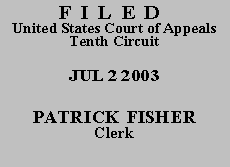

| VIRGINIA KNAPP,
Plaintiff-Appellant, v. JO ANNE B. BARNHART, Commissioner, Social Security Administration, Defendant-Appellee. |
|
Plaintiff Virginia Knapp appeals from an order of the district court affirming the Commissioner's determination to terminate her prior award of Social Security disability benefits.(1) We affirm.
We review the Commissioner's decision to terminate benefits to determine whether substantial evidence supports the decision and whether correct legal standards were applied. Glenn v. Shalala, 21 F.3d 983, 984 (10th Cir. 1994). "We examine the record as a whole, including whatever in the record fairly detracts from the weight of the [Commissioner's] decision and, on that basis, determine if the substantiality of the evidence test has been met." Id. (quotation omitted).
An eight-part sequential evaluation process is used in termination reviews. See 20 C.F.R. § 404.1594(f)(1) through (8). The Commissioner bears the burden of showing medical improvement by establishing that the claimant's medical condition has improved, the improvement is related to the claimant's ability to work, and the claimant is currently able to engage in substantial gainful activity. Glenn, 21 F.3d at 987 (citing regulations). In deciding whether to terminate benefits, a claimant's impairments are considered together. See 20 C.F.R. § 404.1594(d).
Ms. Knapp was originally found to be disabled as of May 2, 1988, due to bipolar disorder and substance abuse. The administrative law judge (ALJ) determined her disability ceased as of September 1, 1998, as she could return to her past work as an office helper and file clerk and could perform other jobs identified by the vocational expert.
On appeal, Ms. Knapp concedes she no longer suffers from substance abuse. However, she argues she has not improved sufficiently so that she can return to work. She states that she suffers from the most severe form of Bipolar Disorder. She maintains that she has trouble meeting her basic needs, has no energy, needs help with weekly shopping, can only drive locally, cannot concentrate and has auditory hallucinations. She argues that she can function only sporadically. Ms. Knapp also maintains that the ALJ did not properly evaluate the opinion of her treating physician.
The record does not support Ms. Knapp's contentions. Although she had a history of numerous hospitalizations for psychotic episodes, depression and hallucinations at the time she was determined to be disabled, from 1989 on she was reported to be doing well on medications. She dealt well with family stressors. She reported no hallucinations until October 1998, after she had been notified that her benefits might be terminated.
In December 1998, an evaluator concluded she could adapt to a work situation and her condition was well controlled with medications. Ms. Knapp's counselor conducted a mental status exam in July 1999, ten months after the date it was determined her disability ceased, in which she noted that disruptions in Ms. Knapp's routine caused her to become stressed and confused. She reported that Ms. Knapp had marked limitations in her ability to concentrate, perform activities within a schedule, sustain an ordinary routine without supervision, work with others without being distracted by them, and make simple work-related decisions. She stated that Ms. Knapp was severely limited in her ability to complete a normal workday without interruptions from psychologically-based symptoms and in her ability to get along with coworkers. She concluded that Ms. Knapp "probably could not consistently and independently carry out instructions of any simplicity or complexity," as she was only in partial remission. Aplt. App., Vol. 2 at 343.
While this report and a residual functional ability form completed in September 2000, would indicate that Ms. Knapp's disability was continuing, the medical records do not support these reports. The medical records through February 2001, show that Ms. Knapp demonstrated no unusual psychological symptoms and was having no hallucinations. She was doing well on her medications and was able to work through family stressors without any severe exacerbation of her psychological symptoms.(2) See, e.g., id. at 354-96.
Opinions of treating physicians should receive controlling weight when they are well-supported by medically acceptable clinical and laboratory techniques and are not inconsistent with the other substantial evidence in the record. Castellano v. Sec'y of Health & Human Servs., 26 F.3d 1027, 1029 (10th Cir. 1994). The ALJ may resolve conflicting medical opinions. Eggleston v. Bowen, 851 F.2d 1244, 1246-47 (10th Cir. 1988). Further, the ultimate decision of whether a claimant is disabled is reserved to the ALJ. See Castellano, 26 F.3d at 1029. The ALJ properly rejected the opinions expressed in the mental status exam and the residual functional ability form as they were not supported by the record.
The judgment is AFFIRMED.
Entered for the Court
Circuit Judge
*. This order and judgment is not binding precedent, except under the doctrines of law of the case, res judicata, and collateral estoppel. The court generally disfavors the citation of orders and judgments; nevertheless, an order and judgment may be cited under the terms and conditions of 10th Cir. R. 36.3.
1. After a claimant has been awarded disability benefits, the Commissioner is required to review the case periodically to determine whether there has been any medical improvement in the claimant's condition and whether that improvement affects the claimant's ability to work. 20 C.F.R. § 404.1594(a).
2. Ms. Knapp threatened to hospitalize herself when she was experiencing additional stress with her pregnant daughter. However, her therapists did not determine that she needed hospitalization and she coped with the situation.